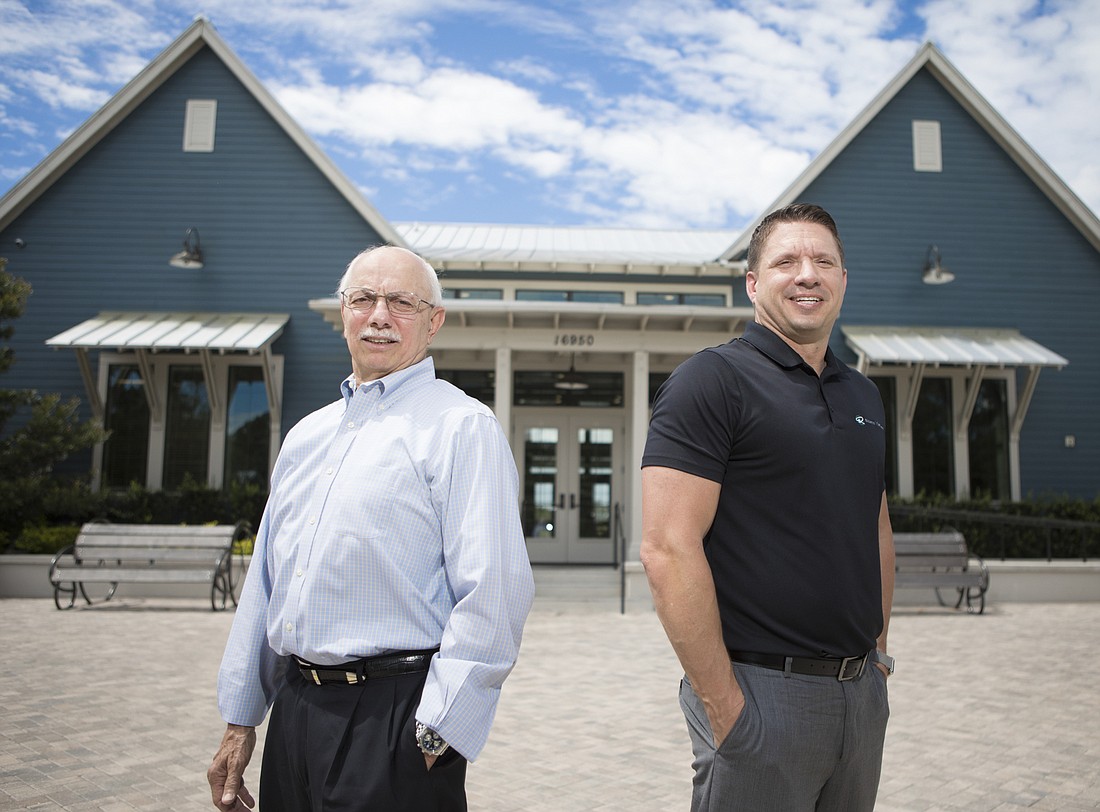- November 22, 2024
-
-
Loading

Loading

They say it takes a village to raise a child, but what does it take to raise a village?
Increasingly, the answer to that question is community development districts.
CDDs fell out of favor after the housing market crash, for a variety of reasons, including some that ran into debt issues.
But the payment structures have since made a comeback, led by Tampa-based Rizzetta & Co. Of the 600 CDDs in Florida, Rizzetta & Co. — under the guidance of founder and president Bill Rizzetta and district services director Eric Dailey — operates 118 of them.
“The CDD is a public entity, a unit of government. Our purpose is to run that unit of government, like a city manager or county administrator.” Bill Rizzetta, founder and president of Rizzetta & Co.
CDDs are a finance and management mechanism for planned communities in Florida — an extremely limited, micro-level form of government. With help from entities like Rizzetta & Co., builders use CDDs to issue bonds for construction and then, when the community is built out, a manager is appointed who reports to the residents and oversees functions such as maintenance, accounting, budget preparation and running meetings with residents.
“The recession caused a huge dropoff in CDDs,” says the 65-year-old Rizzetta. “But the population boom in Florida has been driving demand.”
On the west coast of Florida, Rizzetta & Co. manages CDDs in a host of communities. The list includes Fishhawk Ranch, Bexley, Wiregrass, Connerton and Concord Station in the Tampa Bay region, as well as Bella Vida in Cape Coral and Paseo in Fort Myers.
Builders, says Rizzetta, find CDDs to be a cost-effective, low-risk way to get new developments up and running. It also beats going to a bank for financing or internal equity.
“The financing aspect becomes very attractive to developers," Rizzetta says, "because building all the upfront improvements — the roads, the water lines, the sewer lines and amenity centers — a lot of those expenses occur upfront, and having the availability of financing from the CDD, which draws from the public financing market, is attractive.
CDDs are also attractive to investors, Rizzetta adds, because unlike homeowners’ association (HOA) fees, CDD fees are added to residents’ property tax assessments.
“People may not pay their credit card bill; they might not even pay their cable TV bill,” he says. “But they're going to pay their property tax because if they don't, they could lose their house. And that's a big benefit to the bondholders.”
CDDs also differ from HOAs in that “the CDD doesn’t enforce deed restrictions on people’s private property,” Rizzetta explains. “The CDD is a public entity, a unit of government. Our purpose is to run that unit of government, like a city manager or county administrator.”
Rizzetta & Co. operates CDDs on a fee-for-service arrangement that can be terminated at any time if a community board votes to do so. But that rarely happens: Rizzetta says about 80% of its CDD clients have been with the company for more than a decade.
The company’s annual fee starts at $50,000, depending on the size of the community. Privately held, Rizzetta & Co. doesn’t disclose specific revenues but a quick bit of cocktail-napkin math reveals it would bring in at least $5.5 million a year from service fees alone. (The company makes money other ways, including from HOA fees.)
In general, Rizzetta says revenues grew between 12% and 15% from 2016 to 2017, and the firm’s three-year cumulative growth, from 2015 to 2017, was 25%. “I expect to be on a good growth path for the next four to five years,” he says, adding Rizzetta & Co. has 10 more CDD agreements pending.
For a company that manages so many communities, Rizzetta & Co. is lean. Including CDD managers, the firm has 125 staff members. Finding the right ones, a common theme for most businesses, is a a core challenge.
Dailey says government experience isn’t a prerequisite for running a CDD — some of Rizzetta & Co.’s best hires have come from completely unrelated fields. One aspect all potential hires have in common is they must attend at least one community board meeting, in person, to get a sense of what the job entails.
“The resume is not as important as the individual,” Dailey says. “We are in a business where we can’t shield [a new hire] from our client for very long, and once they get in front of the client, that’s a relationship that makes a connection very quickly.”